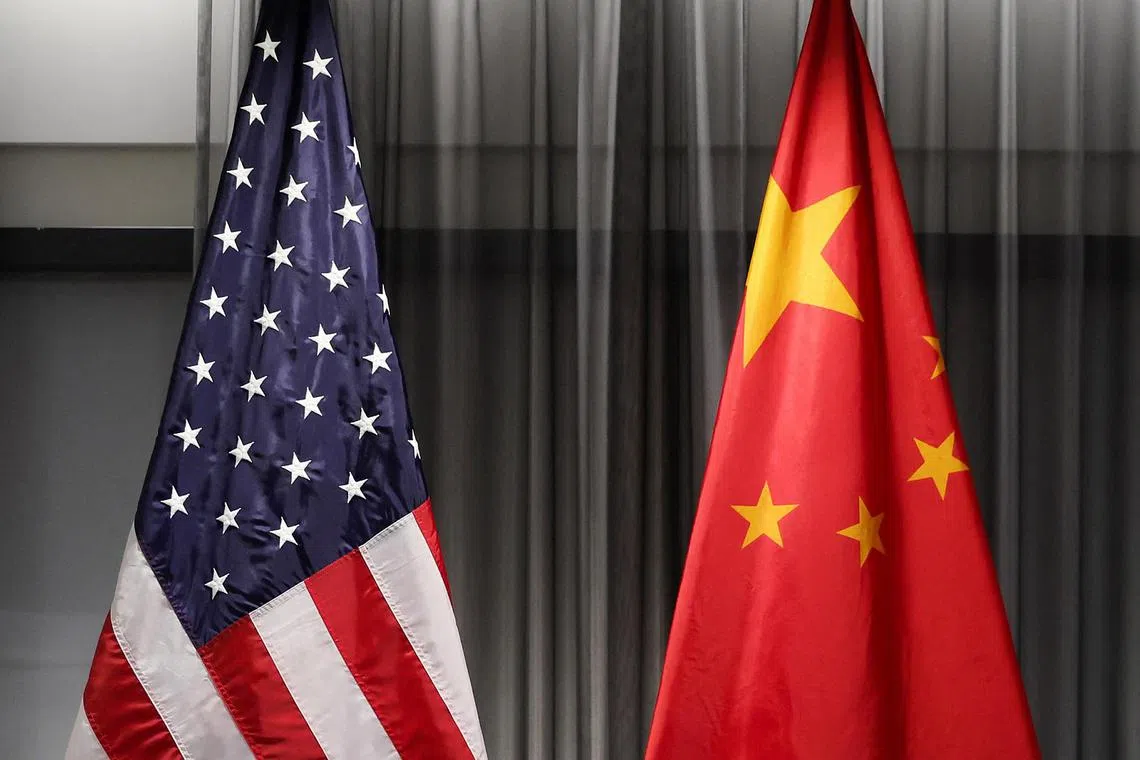Prominent Chinese scholar raises hope on US-China thaw over trade disputes
Sign up now: Get ST's newsletters delivered to your inbox

Washington is interested in working on bilateral issues with Beijing, which has also become more pragmatic, said noted China expert David Daokui Li.
PHOTO: REUTERS
SINGAPORE – China and the United States, the world’s two largest economies, are more likely to sort out some of their trade disputes in the next couple of years rather than scale up geopolitical tensions.
That is the view of Professor David Daokui Li who addressed on Wednesday – via an online video call – a conference organised by the Bank of Singapore at Sands Expo and Convention Centre. He is director of the Academic Centre for Chinese Economic Practice and Thinking at Tsinghua University in Beijing.
The former adviser to the Chinese central bank said he is optimistic that despite the rising anti-China rhetoric in the US, President Joe Biden and his team are interested in working on bilateral issues with their Chinese counterparts who have also become more pragmatic.
“The US and China may even reach some kind of an agreement this year or next,” Dr Li said, referring to the tit-for-tat tariff war that began under former US president Donald Trump in 2018.
“It takes two hands to clap. In principle, the Chinese side has become more pragmatic than it was two, three years ago, and is not seeking to provoke or scale up any military, ecological or economic disputes with the US.”
He noted that the US leadership also understands how the trade war has raised the cost of doing business and would like to lower tariffs to bring down inflation that reached 40-year highs in America in 2022.
The remarks from Dr Li, who is renowned for his insight into Chinese economic thinking and practice, comes at a time when Beijing has dropped its growth-deterring zero-Covid policy and eased its regulatory crackdown on the technology
Hopes of a thaw were raised last November when President Xi Jinping met Mr Biden in Bali
Addressing the conference, dubbed Beyond 2023: Opportunities On The Horizon, Dr Li said the two sides have displayed their ability to work together on the dispute over Chinese firms’ listings in the US.
American accounting watchdog Public Company Accounting Oversight Board last November said it has gained full access to inspect and investigate Chinese companies for the first time, after Beijing gave the green light in August.
More than 100 Chinese tech companies such as Alibaba, Baidu and JD.com had faced the risk of delisting in the US in 2024 if their audit information was not made available to the US inspectors.
However, Dr Li said some issues between the two economic giants are more complex.
“The US side rightly believes that technology is the single most important thing for the Chinese economy to be able to challenge it,” he added, referring to the curbs imposed in 2022 by Washington on the export of cutting-edge technology and equipment that can be used to make more advanced semiconductors.
He said the US may continue to deny access to certain advanced technologies to Chinese companies for years to come, but US-China trade will continue to grow despite those sanctions.
Trade data released last week by China’s General Administration of Customs showed imports and exports in 2022 added up to a record US$760 billion (S$1 trillion) with the US.
Dr Li said the threat of an escalation of trade and technology tensions comes from the newly elected US Congress, now led by Mr Trump’s Republican Party.
Mr Biden may also avoid being seen as making any big concessions given that the US public opinion of China has turned more negative since 2020, he added.
“The risk is not from the top US leadership but from the grassroots,” he said.
Eighty-two per cent of US adults expressed an unfavourable opinion of China, according to a Pew Research Centre survey, whose findings were released last September.
Professor Kishore Mahbubani, Distinguished Fellow at the Asia Research Institute of National University of Singapore, said the 10-member Association of South-east Asian Nations (Asean) can arrange a trilateral agreement
However, Dr Li believes Europe, especially Britain, is in a better position to act as an intermediary between the US and China if it so desires.
Dr Li said Asean has done a good job so far in managing relations with all the major economic powers.
“Asean as a whole has been playing this game very smartly, very intelligently, by trying to separate politics from business,” he noted.
Dr Li said while Asean maintains close economic relations with China, it has kept a balanced approach towards geopolitical and national security issues over which the US is particularly sensitive.
“That will be the pattern of relationship down the road for at least the next 10 years,” he added, referring to the trade bloc’s ties with China and the US.



